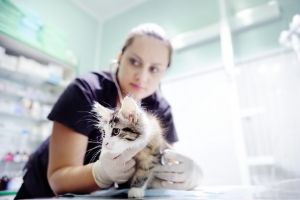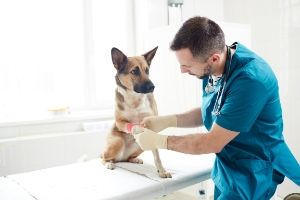Blood tests are an easy, safe, and relatively inexpensive way to peer inside your pets and find potential health problems. Analysis of the numbers and structure of blood cells is important in the diagnosis and monitoring of disease and infection. These tests can help us identify a problem before clinical signs or symptoms appear. But what exactly are we looking for when we do a blood draw on dogs and cats?
Red Blood Cells
There are 3 common tests carried out using red blood cells:
- Packed cell volume
- Hemoglobin concentration
- Red blood cell count
All three are interrelated and help us diagnose diseases. When the proportion of red blood cells is high, the condition is called polycythemia. Polycythemia is common when a pet has dehydration or diarrhea. A low packed cell volume may suggest anemia or bleeding. The results of the tests on red blood cells can tell us a lot about the way your pet’s body is functioning and suggest possible health problems.
White Blood Cells
There are 5 main types of white blood cells:
Neutrophils are the most common type of white blood cell. They engulf (“eat”) infectious particles such as bacteria. They increase in number during inflammation, infection, and short-term stress.
A related type of white blood cell is the eosinophil. The number of eosinophils goes up during allergic reactions and some tissue injuries. Their number also goes up in response to certain tumors and parasites.
Basophils are the least common type of white blood cell. They are also related to neutrophils and eosinophils. An increase in the number of basophils is associated with inflammation.
Monocytes are large cells that serve mainly as phagocytes and increase in number during chronic diseases.
Lymphocytes are the white blood cells responsible for antibody production and cell-mediated immune responses. Large increases in the number of lymphocytes often indicate leukemia, a type of cancer.
Platelets, or thrombocytes, are cell-like particles in the blood. Platelets are much smaller than red or white blood cells. They perform a critical role in the clotting process to repair damaged blood vessels. Thus, injuries often prompt a large increase in the number of platelets. Some autoimmune diseases, blood clotting disorders, and bone marrow problems cause a decrease in the number of platelets.

How Does the Blood Test Help My Pet?
Having these tests performed can help point to a diagnosis, particularly if the animal has signs and a history that could make it difficult to determine the problem.
Below is a basic group of blood tests for pets:
Based on the results of this group of tests, other tests may be carried out as needed to reach a definite diagnosis.
- Total Protein: Increases due to dehydration or inflammation; may decrease due to bleeding, malnutrition, or congestive heart failure Albumin: Increases due to dehydration; may decrease due to bleeding, congestive heart failure, or liver failure
- Globulin: Calculated as the difference between total protein and albumin Urea: Increases due to certain dietary excesses or deficiencies, congestive heart failure, kidney failure, or a ruptured bladder; decreases may be due to liver failure or low levels of dietary protein
- Creatinine: Increases may be due to kidney disorders, muscle damage, or a ruptured bladder
- Glucose: Increases may be caused by diabetes or short-term stress; decreases may be found in cases of neurologic disease or malnutrition ALT and ALP: Increases in these enzymes may indicate liver damage, muscle damage, or increased thyroid gland activity
Here is a list of maladies that we can help uncover through pet bloodwork:
- Dehydration
- Inflammation
- Infection Bleeding (internal and external)
- Malnutrition
- Blood cancer
- Bone marrow disease
- Congestive heart failure
- Kidney failure
- Liver failure
- Ruptured bladder
- Damaged muscles
- Diabetes
- Lyme Disease
- Poisoning
How Does Bloodwork Help Prepare My Pet For Surgery?
Bloodwork performed on cats and dogs before anesthesia and surgery can tell us how to prepare your pet for the procedure, how to help your pet recover and determine if your pet should go through the procedure at all. We want your pet to be healthy enough - not only to go through a medical procedure - but also to recover without any complications from hidden conditions that bloodwork can easily reveal beforehand. Your veterinarian will share with you whatever concerns they have, should bloodwork uncover a condition that could impact the efficacy, timing, and duration of surgery.
Blood tests add immense value to the prevention, diagnosis, and treatment of pet disease. Whether your pet is a senior, or still young in years, routine bloodwork is an important part of your pet’s healthcare.

Should My Pet Get Bloodwork During This Pandemic?
Much like with every other facet of our lives, the ways in which we treat our pets with our veterinary services have evolved with the advent of COVID-19. While some states have essentially opened up and others are talking about phased openings, veterinary services largely remain for urgent pet care needs only. And most if not all practices are curbside and telemedicine only for the foreseeable future. You can remain current on how COVID-19 relates to your pet on the AVMA and CDC websites.
Of course, if you notice your pet is lethargic, not eating, or acting sick in other ways, give us a call to discuss the possibility of getting some blood drawn to get to the root of the problem.

